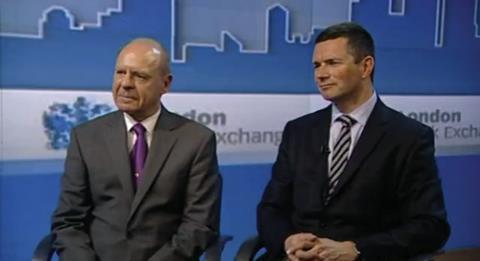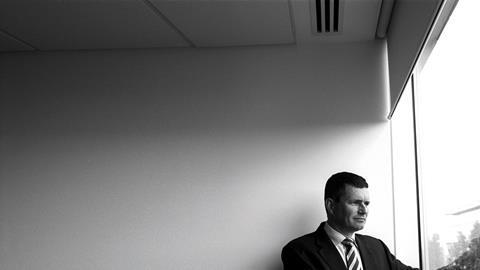After the May Gurney saga, what now for Costain? Building looks at the company’s options
What a difference a month makes. Towards the end of March, the non executive chairman of Costain, David Allvey, recorded a rather upbeat video interview alongside his counterpart at May Gurney, Margaret Ford, hailing a proposed £178m all-share merger between the two firms.
Fast forward to last Thursday and a slightly more strained-looking Allvey appeared on camera again - this time alongside Costain chief executive Andrew Wyllie - to explain why the much-touted deal had fallen through thanks to a successful £221m bid for May Gurney by Costain’s larger rival Kier.
[Costain] will continue to develop the business both organically and by acquisitions
Andrew Wyllie, Costain
The older film has been taken down from Costain’s website while the new one -prominently displayed on the homepage - makes for uncomfortable viewing. In it, Wyllie and Allvey take part in a wooden and seemingly stage-managed question and answer session, batting away imagined criticisms of their bid for May Gurney and grasping at positives including Wyllie’s claim that Costain has learned from the episode, taking “a great deal out of the last few months”.
Costain has not been giving further interviews and it’s not difficult to see why the company’s leadership - and Wyllie in particular - will feel under pressure given that the failure to land May Gurney follows 2011’s unsuccessful bid for another huge support services firm trading on the stock market - Mouchel. Missing out once is a misfortune, twice looks like carelessness, so the saying goes.
So what’s next for Costain? Is the civil engineering specialist’s overall strategy - to diversify into support services and consulting - still the right one and, if so, how can this now be achieved given its conspicuous failure to buy companies big enough to achieve this in one fell swoop? Moreover, where do the last few weeks leave Wyllie? Could investors see the episode as a sign that fresh blood is required at the top?
The need to expand
At present, Costain believes its £900m-turnover business - which specialises in solving tricky infrastructure problems for national clients such as Network Rail, the Highways Agency and Thames Water - isn’t sufficiently large and is too weighted towards contracting. Around two-thirds of the business is currently devoted to this market, with the remainder split between pre-construction consulting and post-construction support services.
Wyllie said at the time of the May Gurney bid that it was in response to the evolving needs of customers such as the utilities, adding: “We need to position ourselves as in the premier league of tier one suppliers to our customers, and to do that we have to have scale, financial strength and diversity of service offering.”
In last week’s video interview he said future acquisitions are still planned, saying Costain would “continue to develop the business both organically and by acquisitions”.
Analysts agree that this is essentially the right approach, especially given the depressed state of the contracting sector. But some speculate that with Costain having twice now tried to bite off more than it can chew, it could now find itself a target for acquisition.
“I don’t think [the May Gurney result] means Costain’s strategy of focusing on infrastructure and the top 40 customers is under threat,” says William Shirley, analyst at Liberum Capital.
“That has stood them in very good stead and won’t change. But they’ve had two potentially transformational bids fall through and, to me, that could make them more vulnerable to a takeover.”
To bolster its position, analysts believe Costain should draw up a less ambitious acquisition plan, and fast.
“Particularly in the quoted market, they’ve got to set their sights lower in terms of cost so they’re not in the same position of disadvantage against other bidders that might come in,” says Kevin Cammack, analyst at Cenkos Securities.
“They need to be looking at firms which are far more digestible and where they can allow themselves some wriggle room to change their terms. But I don’t think there is a specific Plan B.”
One scenario might involve Costain buying up a series of smaller, privately-owned firms over time, thereby carrying out its strategy in a less risky but slower way. Last summer, Wyllie said the firm was looking to acquire specialist engineering practices. This followed its purchase of ClerkMaxwell, an engineer specialising in the energy sector in April 2011.
There is also some evidence that it could do something similar in the support services sector given that it also bought Promanex, an industrial support services business with a turnover of £55m, in August of the same year.
They’ve got to set their sights lower in terms of cost so they’re not in the same position of disadvantage against other bidders that might come in
Kevin Cammack, Cenkos Securities
A bolder approach of course would be to make another bid for larger support services firms such as Morrison Utility Services or even the restructured Mouchel - now 95% owned by the banks. But that, of course, invites the possibility of a third high-profile acquisition miss. Kier’s successful 315p offer for May Gurney included £35m in cash and many believe Costain will need to start raising cash in order to sweeten future acquisition bids sufficiently.
Stephen Rawlinson, analyst at Whitman Howard, says the firm is “between a rock and a hard place in terms of paying for an acquisition.”
“Costain’s shareholders may not necessarily be in a position to follow the money and if the firm tried to raise the cash to buy a privately-owned business, it could find it very difficult,” he says.
“The firm’s strategy still should be implemented, it’s what their customers say they want, but Costain will need to do it slowly, piece by piece. There are bags of companies that the firm should be looking at. It’s just that it is going to take time to raise the cash.”
Confidence in the leadership
While there is clearly a degree of urgency, Costain does perhaps have some time to do this and could also use such a period to focus on its existing business - serving its top clients to the best of its abilities and forming joint ventures when required to bid for larger-scale contracts.
But will Costain’s current leadership be given this luxury? While there is a great amount of respect in the industry for the day-to-day management of the business demonstrated by Wyllie - a former managing director of Taylor Woodrow Construction who joined Costain in 2005 - observers are less complimentary about his deal-making record, with some expressing bemusement about the bid for May Gurney given the likelihood of a Kier counter-offer.
In addition to the valuable management time, Costain will have spent a significant sum on professional advice, with Whitman Howard’s Rawlinson estimating that Costain is likely to have spent about £5m on it.
“That [would be] around 25% of one year’s profit and yet it is unlikely that they could have succeeded in buying the company,” he argues.
“Everyone who knows about the industry knew that Kier wanted to buy either Enterprise or May Gurney.”
Rawlinson applauds Costain’s “discipline” in offering to pay only what it thought was right for its own shareholders but also believes its offer of £253.2p per share was pitched too low to make it difficult to beat.
Others also question the logic of chasing May Gurney given how far removed its services - including providing bin collection and street sweeping services to councils - are from Costain’s more technical core offer.
Whether the current leadership is given a third opportunity to transform Costain may depend on the attitude of two of the firm’s major investors - Malaysian infrastructure group UEM Builders and Kuwaiti firm the Kharafi Group - which between them hold more than 40% of its shares.
Cammack, for one, believes that Wyllie has done just enough to retain confidence in his position.
“I’d rather get one or two things wrong in my acquisition strategy than get things wrong in terms of the business I’m actually running,” he points out.
“But he certainly can’t make another mistake like this.”
WHAT NOW FOR ANDREW WYLLIE?
William Shirley, analyst at Liberum Capital
“The failed deals are unhelpful but clearly preferable to overpaying. His strategy since he took over has been the right one and I personally don’t think his position is under threat.”
Tony Williams, analyst at Building Value
“I think Wyllie has done a pretty fair job and I think the bid for May Gurney was a really good idea. What he shouldn’t do in my view is go after another listed firm and risk failure. He’s been unlucky but please don’t be unlucky a third time.”
Kevin Cammack, analyst at Cenkos Securities
“I do feel for him - he does not deserve a ‘jilted at the altar’ tag and you can see clearly the basis of his intended strategy. If anything, Costain has been a bit naive and needs to be more savvy in identifying targets where it has a far better chance of success.”
How times change

Costain chairman David Allvey, 26 March 2013:
“The Costain strategy has been extremely clear: to become a leader in the design, delivery and maintenance of national infrastructure. The announcement today is a highly significant step in that process. Together with May Gurney, we will have the added experience and skills to underline our leadership status and to provide a platform for new growth and success.”
Costain chairman David Allvey, 25 April 2013:
“We announced in March a recommended offer for May Gurney which we believed fully reflected the value of May Gurney following several months of due diligence. Indeed that offer received the unanimous recommendation of the May Gurney board.
“Earlier this week the Kier Group announced an offer at some 35% higher. We believe the offer we made fully reflected the value of the business and we have concluded we will not increase that offer.”




























No comments yet